Prefab Worker’s Dormitory Solutions by Lida Group Combine the Durability of Sandwich Panels with Mobile Convenience
2025-Sep-04 15:29:15
By Admin
Introduction
The global construction industry is in the midst of a transformation, driven by the need for faster project delivery, improved worker welfare, and sustainable practices. Among the most pressing challenges faced by construction firms worldwide is the provision of safe, comfortable, and practical accommodation for on-site workers. Traditional worker dormitories—often constructed using ad-hoc materials like brick, wood, or low-grade steel—fall short on multiple fronts: they are time-consuming to build, prone to damage, difficult to relocate, and frequently fail to meet basic safety and comfort standards. This gap has created a demand for innovative prefabricated (prefab) solutions that balance durability, functionality, and flexibility.
Lida Group, a pioneer in modular and prefabricated building systems, has emerged as a leader in addressing this need with its prefab worker’s dormitory solutions. What sets Lida’s offerings apart is their unique integration of two critical attributes: the unmatched durability of sandwich panels and the unparalleled convenience of mobile, modular design. Sandwich panels—composed of two outer facings and a lightweight core—provide exceptional structural strength, insulation, and resistance to harsh conditions, while the modular, mobile framework ensures rapid deployment, easy relocation, and adaptability to changing project needs.
This article explores how Lida Group has mastered the synergy between sandwich panel durability and mobile convenience to redefine prefab worker accommodation. It examines the industry context that necessitates such innovations, delves into the technical specifications and benefits of sandwich panels, details the mobile design features of Lida’s dormitories, highlights technological advancements, presents real-world case studies, and outlines the company’s competitive edge. Finally, it concludes with insights into the future of prefab worker dormitories and Lida’s role in shaping the industry.
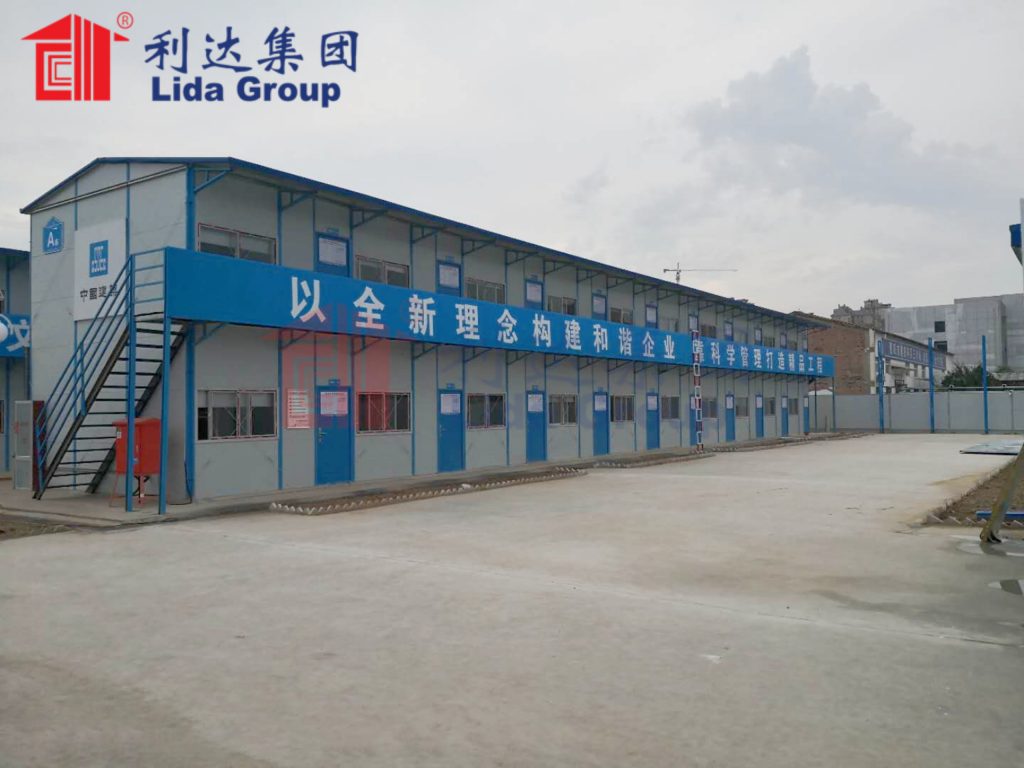
Industry Context: The Need for Durable, Mobile Worker Accommodation
To appreciate the significance of Lida Group’s solution, it is essential to first understand the limitations of traditional worker accommodation and the evolving demands of the construction sector. For decades, construction companies relied on two primary approaches to housing workers: on-site construction of temporary structures or low-quality prefab units that prioritized cost over performance. Both methods have proven increasingly inadequate in today’s fast-paced, regulation-driven industry.
Shortcomings of Traditional Accommodation
On-site temporary dormitories, built using brick, concrete, or wood, are inherently inefficient. They require significant labor and time to construct—often taking 4–8 weeks to complete—delaying the start of core construction activities. These structures are also poorly insulated, leading to uncomfortable living conditions in extreme temperatures, and lack resilience against weather events like heavy rain, strong winds, or snow. Moreover, they are not designed for relocation; once a project ends, they are typically demolished, generating substantial construction waste and increasing environmental impact.
Low-quality prefab units, while faster to deploy than on-site construction, suffer from their own flaws. Many are made from thin, flimsy materials that lack structural integrity, making them vulnerable to damage during transportation or use. They often fail to meet fire safety standards, offer minimal insulation, and provide cramped living spaces with few amenities—contributing to low worker morale and productivity. Additionally, their rigid design limits customization, making it difficult to adapt to varying workforce sizes or site constraints.
Evolving Industry Demands
The construction industry’s priorities have shifted dramatically in recent years, driving the need for better accommodation solutions. Three key trends are particularly influential:
- Speed and Efficiency: Construction projects are under increasing pressure to meet tight deadlines. Delays caused by slow accommodation setup can lead to cost overruns and lost opportunities. Firms now seek solutions that can be deployed in days, not weeks.
- Worker Welfare Regulations: Governments and regulatory bodies worldwide are implementing stricter standards for worker accommodation. These standards mandate minimum space requirements, fire safety features, proper ventilation, and access to amenities—making subpar solutions non-compliant and legally risky.
- Sustainability: The industry is embracing sustainability to reduce its carbon footprint. This includes minimizing waste, using eco-friendly materials, and adopting reusable solutions. Traditional dormitories, which are often single-use and wasteful, conflict with these goals.
Against this backdrop, Lida Group’s prefab worker’s dormitories—combining sandwich panel durability and mobile convenience—have emerged as a solution that addresses all these challenges, offering speed, compliance, sustainability, and comfort in a single package.
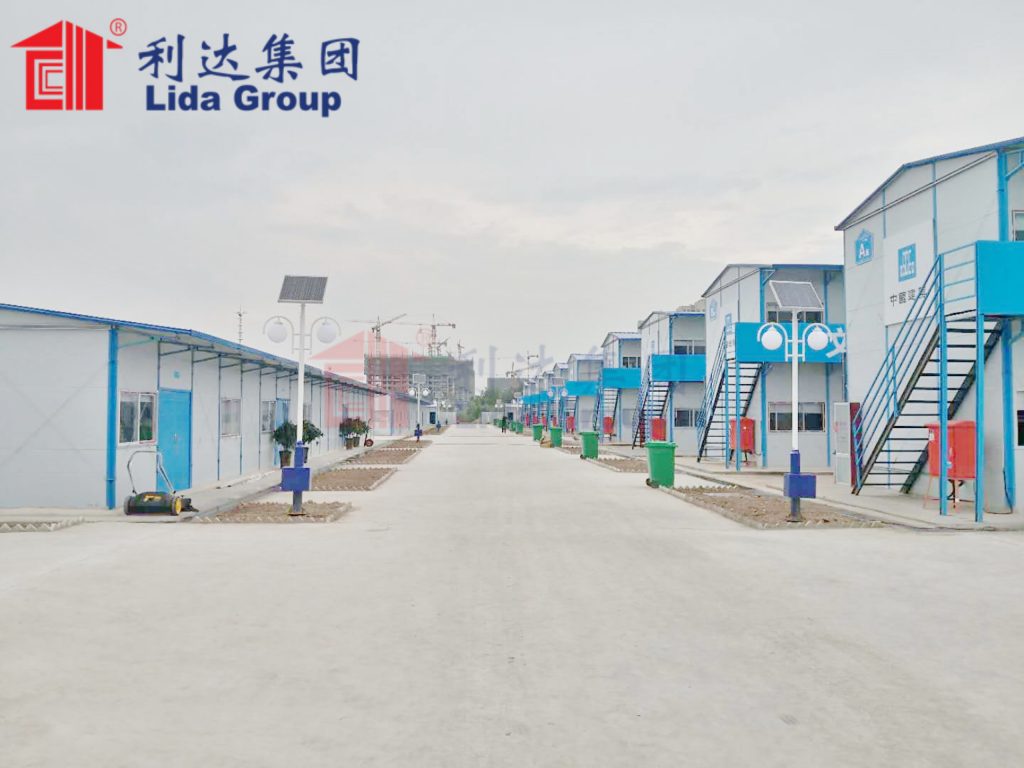
Sandwich Panels: The Foundation of Durability
At the core of Lida Group’s prefab worker’s dormitories is the use of high-quality sandwich panels—a material that has revolutionized prefabricated construction due to its exceptional durability, insulation, and versatility. Sandwich panels consist of three layers: two rigid outer facings (typically made of steel, aluminum, or fiber-reinforced polymer) and a lightweight core (such as polyurethane foam, rock wool, or polystyrene). This layered structure gives them unique properties that make them ideal for worker dormitories.
Key Properties of Lida’s Sandwich Panels
Lida Group sources and manufactures sandwich panels to meet the highest industry standards, ensuring that its dormitories are built to last. The key properties of these panels include:
Structural Strength and Load-Bearing Capacity
The outer facings of Lida’s sandwich panels are made from high-grade galvanized steel or aluminum, which provide excellent structural rigidity and load-bearing capacity. This allows the panels to withstand heavy loads—such as snow accumulation on roofs or wind pressure—without deformation or damage. The core material, while lightweight, adds to the panel’s strength by distributing stress evenly across the surface. As a result, Lida’s dormitories can withstand extreme weather conditions, including hurricanes, heavy snowfall, and seismic activity, making them suitable for use in diverse geographic regions.
Superior Insulation Performance
One of the most significant advantages of sandwich panels is their thermal insulation properties. The core material—especially polyurethane foam and rock wool—acts as a barrier to heat transfer, keeping the interior of the dormitories cool in hot climates and warm in cold ones. Lida’s panels have a thermal conductivity rating as low as 0.022 W/(m·K), significantly better than traditional building materials like brick (1.0–1.2 W/(m·K)) or wood (0.12–0.25 W/(m·K)). This insulation not only improves worker comfort but also reduces energy consumption for heating and cooling, lowering operational costs and environmental impact.
In addition to thermal insulation, sandwich panels offer excellent acoustic insulation. The layered structure absorbs sound, reducing noise transmission between rooms and from the external environment. This is particularly important for worker dormitories, where rest and privacy are essential for maintaining productivity.
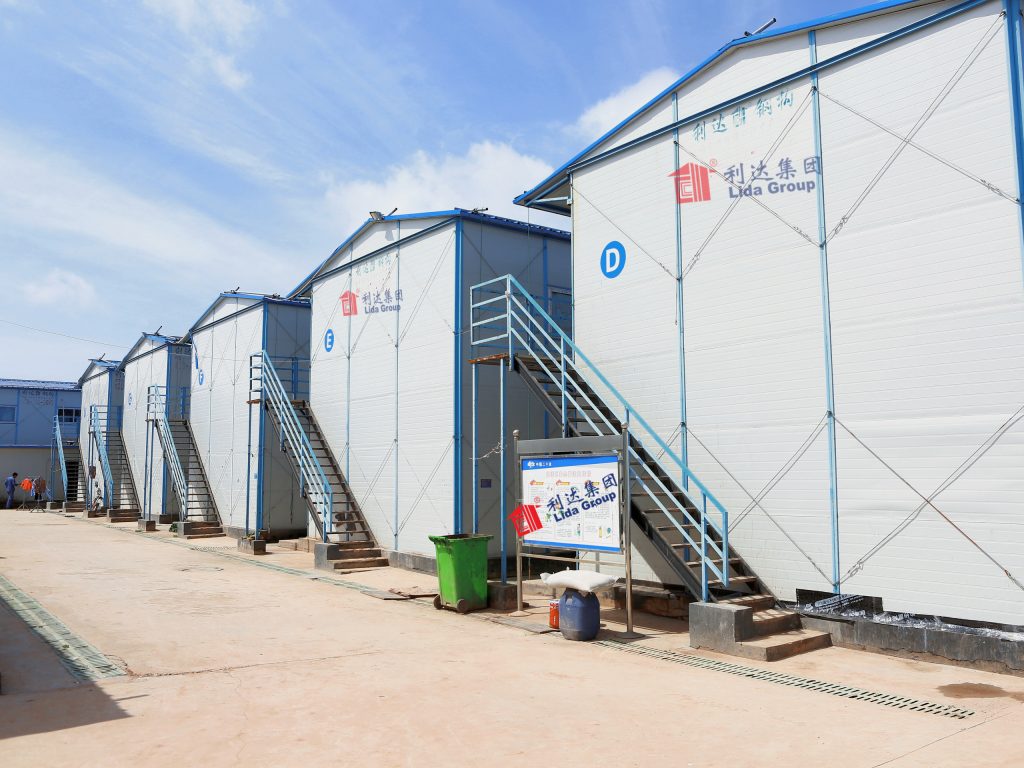
Fire Resistance and Safety
Fire safety is a critical concern for worker accommodation, and Lida’s sandwich panels are engineered to meet or exceed global fire safety standards. Depending on the core material selected, the panels offer varying levels of fire resistance:
- Rock wool core panels: Non-combustible and able to withstand temperatures up to 1,000°C, making them ideal for high-risk environments.
- Polyurethane foam core panels: Treated with fire-retardant chemicals to slow combustion and reduce smoke production, meeting Class B fire ratings in most regions.
All panels are also designed to prevent the spread of fire, with tight joints and fire-resistant sealants used during assembly. This ensures that in the event of a fire, the dormitories provide a safe environment for workers to evacuate.
Weather Resistance and Durability
Lida’s sandwich panels are treated with anti-corrosion coatings, such as zinc or polyester, to protect against rust and degradation caused by moisture, salt, and UV radiation. This makes them suitable for use in coastal areas, humid climates, and regions with high levels of air pollution. The panels are also water-resistant, preventing leaks and water damage that can compromise the structural integrity of the dormitories. With proper maintenance, Lida’s sandwich panel dormitories have a lifespan of 15–20 years, significantly longer than traditional temporary accommodation.
Lightweight and Easy to Install
Despite their durability, sandwich panels are lightweight, which simplifies transportation and installation. Unlike heavy brick or concrete, the panels can be easily lifted and maneuvered using standard construction equipment, reducing the need for specialized labor. This lightweight nature also contributes to the mobile design of Lida’s dormitories, making them easier to relocate when projects end.
Mobile Convenience: Modular Design for Flexibility and Speed
While sandwich panels provide the durability foundation, Lida Group’s prefab worker’s dormitories stand out for their mobile, modular design—engineered to deliver unmatched convenience in deployment, relocation, and customization. Modular construction involves manufacturing individual units (modules) in a controlled factory environment, then transporting them to the site for assembly. This approach eliminates the inefficiencies of on-site construction and enables rapid setup.
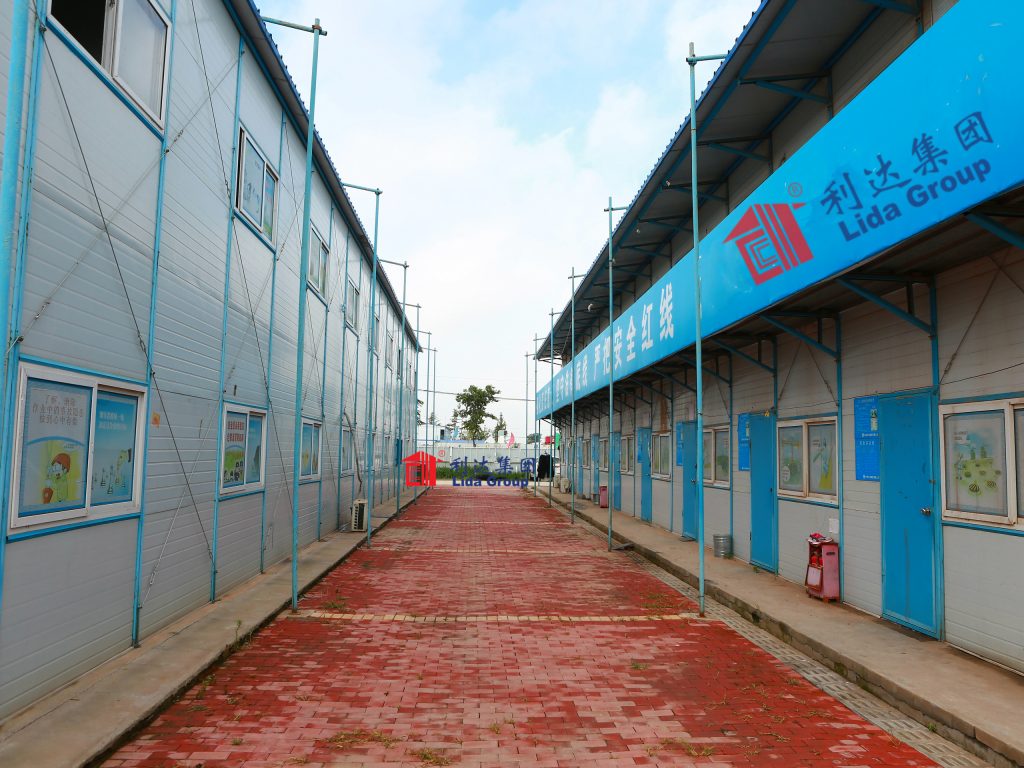
Key Features of Lida’s Mobile Modular Design
Standardized, Interchangeable Modules
Lida’s dormitories are composed of standardized modules that can be easily combined or reconfigured to meet the needs of different projects. Each module is a self-contained unit, typically measuring 3m (width) × 6m (length) × 2.8m (height), and can accommodate 2–6 workers depending on the configuration (single, double, or multi-occupancy). The modules are designed with interchangeable components—such as doors, windows, and internal fixtures—allowing for quick customization. For example, a project requiring additional bathroom facilities can easily integrate dedicated bathroom modules, while a larger workforce can be accommodated by adding more sleeping modules.
Rapid Deployment and Assembly
The factory manufacturing of modules ensures consistent quality and reduces on-site work to a minimum. Once transported to the site, the modules are assembled using a simple bolt-together system, requiring no heavy construction equipment beyond a crane for lifting. A standard dormitory complex for 50 workers—consisting of 10 sleeping modules, 2 bathroom modules, 1 kitchen module, and 1 common area module—can be fully assembled in 3–5 days. This is a fraction of the time required for traditional on-site construction, enabling construction companies to mobilize workers faster and start core project activities sooner.
Easy Relocation and Reusability
Unlike traditional dormitories, which are permanent or difficult to move, Lida’s modular dormitories are designed for relocation. When a project ends, the modules can be disassembled, transported to a new site, and reassembled with minimal effort. The sandwich panels’ durability ensures that the modules remain intact during transportation, even over long distances. This reusability not only reduces construction waste but also lowers long-term costs, as companies do not need to build new dormitories for each project.
Compact Design for Site Constraints
Construction sites often have limited space, and Lida’s modular dormitories are designed to maximize space efficiency. The modules can be stacked up to three levels high (using steel support frames) to reduce the footprint of the dormitory complex. This is particularly valuable for urban construction projects, where space is at a premium. Additionally, the modules can be arranged in linear or L-shaped configurations to fit irregular site layouts.
Integrated Utilities for Turnkey Operation
Lida’s modules come with pre-installed utilities, including electrical wiring, plumbing, heating, ventilation, and air conditioning (HVAC) systems. This eliminates the need for on-site utility installation, further speeding up deployment. The electrical systems are designed to meet local standards, with circuit breakers, energy-efficient lighting, and outlets for charging devices. Plumbing systems include water-saving fixtures, such as low-flow showers and toilets, to reduce water consumption. HVAC systems are sized to match the insulation properties of the sandwich panels, ensuring efficient temperature control.
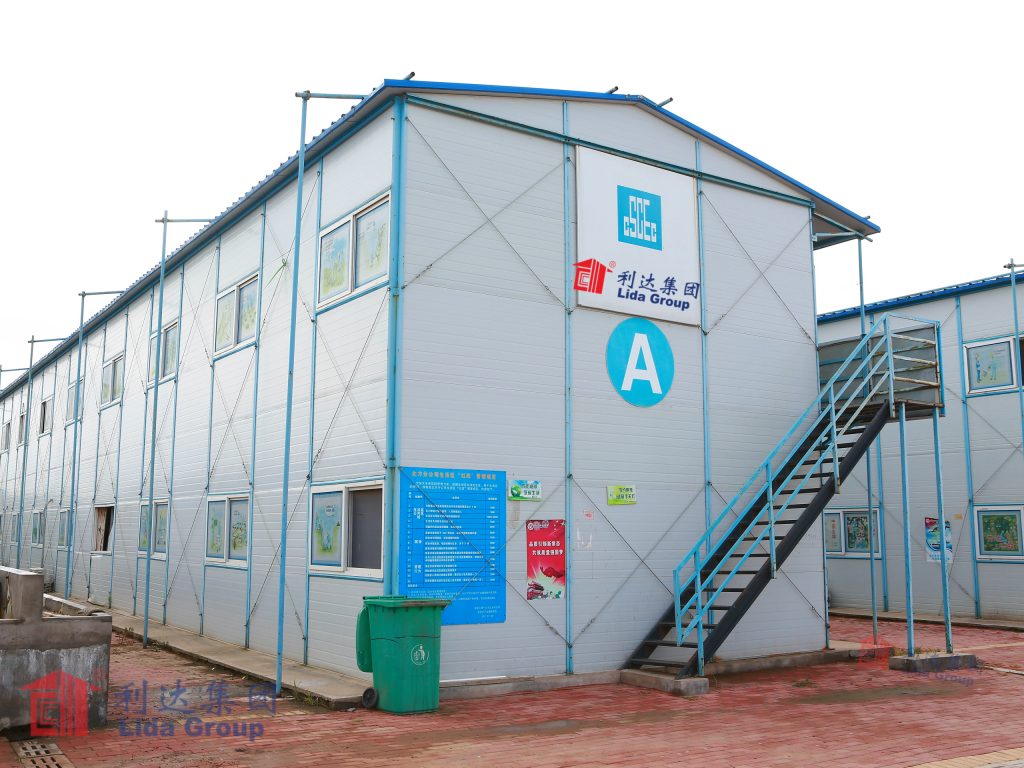
Technological Innovation: Enhancing Durability and Convenience
Lida Group’s commitment to innovation extends beyond materials and design, with the integration of advanced technologies to enhance the durability, efficiency, and user experience of its prefab worker’s dormitories. These technologies leverage digital tools, smart systems, and sustainable solutions to set new industry standards.
Smart Building Management Systems
Lida’s dormitories are equipped with smart building management systems (BMS) that monitor and control key functions, such as lighting, HVAC, and water usage. The BMS uses sensors throughout the dormitories to detect occupancy, temperature, and humidity, adjusting systems automatically to optimize energy efficiency. For example, lights turn off in unoccupied rooms, and HVAC systems reduce output when temperatures are within a comfortable range. This can reduce energy consumption by up to 35% compared to traditional dormitories.
The BMS is accessible via a mobile app or web portal, allowing project managers to monitor performance in real-time. They can track energy usage, identify maintenance issues, and adjust settings remotely—improving operational efficiency and reducing downtime. Workers can also use the app to report maintenance problems or adjust room temperature, enhancing their living experience.
Digital Twin Technology for Design and Maintenance
Lida Group uses digital twin technology to optimize the design and maintenance of its dormitories. A digital twin is a virtual replica of a physical module, created using 3D modeling and real-time data. During the design phase, engineers use digital twins to simulate performance under different conditions—such as extreme weather or varying occupancy—identifying potential issues before manufacturing. This reduces the need for costly rework and ensures that the modules meet durability and safety standards.
Once deployed, sensors in the physical modules feed data into the digital twin, allowing project managers to monitor structural integrity, energy usage, and maintenance needs. For example, the digital twin can predict when HVAC filters need replacement or when electrical components are at risk of failure, enabling proactive maintenance. This extends the lifespan of the dormitories and reduces operational costs.
Sustainable Manufacturing and Materials
Sustainability is a core focus of Lida’s innovation strategy, and the company has implemented several measures to reduce the environmental impact of its dormitories. In addition to using reusable modules, Lida prioritizes eco-friendly materials in its sandwich panels. For example, the company offers panels with recycled steel facings and bio-based foam cores, reducing reliance on virgin materials. The factory manufacturing process also minimizes waste, as materials are precisely cut and measured, and excess materials are recycled or repurposed.
Lida also offers optional renewable energy integrations, such as solar panels mounted on the roof of the dormitory modules. These panels generate electricity to power lighting and small appliances, reducing reliance on grid energy. In regions with limited access to electricity, solar-powered dormitories provide a reliable and sustainable solution.
Quality Control Technologies
To ensure the durability of its sandwich panels and modules, Lida Group uses advanced quality control technologies in its factories. This includes automated welding machines for steel facings, which ensure consistent weld quality and structural integrity. The company also uses ultrasonic testing to detect defects in the sandwich panel cores, such as voids or uneven density, which could compromise insulation or strength. Each module undergoes a rigorous inspection before leaving the factory, including pressure testing for plumbing systems and electrical testing for safety compliance.
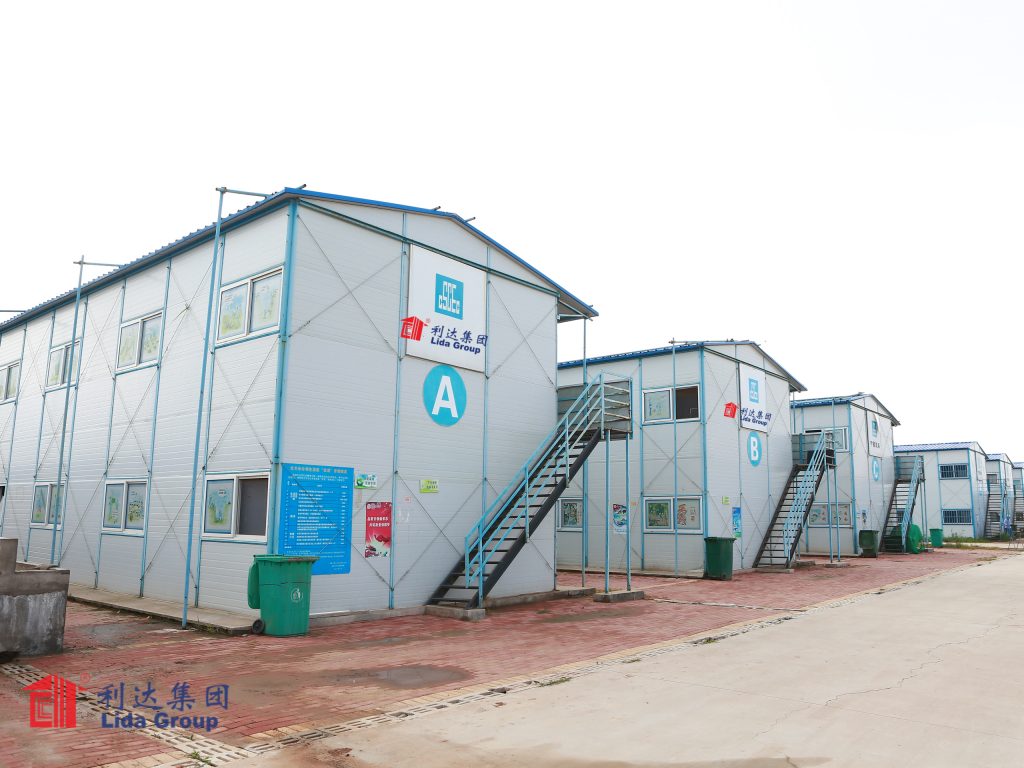
Real-World Case Studies: Proving Durability and Convenience
The effectiveness of Lida Group’s prefab worker’s dormitories—combining sandwich panel durability and mobile convenience—is demonstrated by their successful application in diverse construction projects worldwide. The following case studies highlight the tangible benefits experienced by customers.
Case Study 1: Infrastructure Project in Northern Europe
A major construction company was awarded a contract to build a new railway line in Northern Europe, where harsh winters with heavy snowfall and freezing temperatures are common. The project required accommodation for 200 workers for a two-year period, and the company needed a solution that could withstand the extreme weather while being deployed quickly.
Lida Group provided 40 modular dormitory units, each constructed with rock wool core sandwich panels for fire resistance and thermal insulation. The modules were manufactured in Lida’s factory in Germany and transported to the site via truck. Assembly took just four days, allowing the workers to move in within a week of the modules arriving. The sandwich panels’ insulation properties kept the interior of the dormitories warm, even in temperatures as low as -20°C, reducing heating costs by 40% compared to traditional dormitories.
After the railway project was completed, the modules were disassembled and transported to another construction site in Sweden, where they were reused for a road construction project. The panels showed no signs of damage from the snowfall or transportation, demonstrating their durability and reusability.
Case Study 2: Commercial Construction in the Middle East
A construction firm in the Middle East needed accommodation for 150 workers for a 12-month commercial building project in Dubai, where high temperatures (up to 45°C) and sandstorms are common. The firm required dormitories that could withstand the harsh climate, provide adequate cooling, and be deployed quickly to meet tight project deadlines.
Lida supplied 30 modular units with polyurethane foam core sandwich panels, which offer excellent thermal insulation and resistance to sand and dust. The modules were equipped with high-efficiency HVAC systems and solar panels to reduce energy consumption. The factory manufacturing process took three weeks, and on-site assembly was completed in three days—allowing the workers to start work on schedule.
The sandwich panels’ weather resistance prevented sand from entering the dormitories, and the insulation kept the interior cool, reducing HVAC usage. The solar panels generated 20% of the dormitories’ electricity needs, lowering operational costs. At the end of the project, the modules were relocated to a residential construction site in Abu Dhabi, where they continued to perform reliably.
Case Study 3: Disaster Relief in Southeast Asia
Following a tropical storm in Southeast Asia, a humanitarian organization needed temporary accommodation for 100 construction workers involved in rebuilding efforts. The region had limited infrastructure, and the organization required dormitories that could be deployed quickly, withstand potential future storms, and be easily relocated as the relief effort progressed.
Lida Group donated 25 modular dormitory units, constructed with lightweight yet durable aluminum-faced sandwich panels and polyurethane foam cores. The modules were manufactured in Lida’s factory in Vietnam and transported to the disaster zone via truck and boat. Assembly took just two days, as the modules were designed for quick setup with minimal tools.
The sandwich panels’ water resistance and structural strength protected the dormitories from subsequent rainfall and strong winds, providing a safe living environment for the workers. Once the initial rebuilding phase was complete, the modules were relocated to another affected area, demonstrating their mobility and adaptability.

Competitive Advantage: Why Lida Group Leads the Market
In a crowded market for prefab worker accommodation, Lida Group has established a clear competitive advantage by focusing on the synergy between sandwich panel durability and mobile convenience. The company’s offerings outperform competitors in several key areas, making them the preferred choice for construction firms worldwide.
Unmatched Durability-to-Weight Ratio
Lida Group’s sandwich panel technology delivers an exceptional durability-to-weight ratio that outpaces competitors. While many prefab providers use heavy materials to achieve durability—making modules difficult to transport and assemble—or lightweight materials that sacrifice strength, Lida’s panels strike the perfect balance. The high-grade galvanized steel or aluminum facings provide robust structural support, while the lightweight foam or rock wool core keeps the overall module weight low (typically 1,200–1,500 kg per standard module). This means the modules can be transported using standard trucks (no specialized heavy haulage required) and lifted with small to medium cranes, reducing transportation and assembly costs. Competitors’ modules often weigh 20–30% more for similar durability, limiting their mobility and increasing logistical complexity.
Customization Without Compromise
Unlike many prefab manufacturers that offer limited standard configurations, Lida Group provides extensive customization while maintaining the efficiency of modular production. Customers can tailor everything from room layout (single vs. multi-occupancy) to amenities (additional storage, private bathrooms, or recreational spaces) without delaying manufacturing. This flexibility is made possible by Lida’s standardized module frames and interchangeable components—for example, a module can be reconfigured from a 4-person dorm to a shared kitchen by swapping internal fixtures, all within the same factory production timeline. Competitors often charge premium fees for customization or require extended lead times, making Lida’s offering more adaptable to diverse project needs.
End-to-End Cost Efficiency
Lida’s solutions deliver cost savings throughout the entire project lifecycle, not just upfront. The rapid deployment reduces labor costs associated with on-site construction, while the durable sandwich panels minimize maintenance expenses (e.g., repainting, repairing water damage, or replacing worn components). The reusability of modules further lowers long-term costs: a single set of Lida dormitories can be used for 3–5 projects over 15–20 years, compared to traditional dormitories that are demolished after one use. A 2024 industry study found that construction firms using Lida’s dormitories saved an average of 35% on accommodation costs over a 5-year period, compared to those using traditional or low-quality prefab solutions.
Global Compliance Expertise
Navigating international building codes and worker accommodation regulations is a major challenge for construction firms operating globally. Lida Group’s deep expertise in global compliance sets it apart, as its dormitories are engineered to meet the specific standards of regions including the EU, North America, the Middle East, and Southeast Asia. For example, modules destined for the EU include enhanced fire resistance (meeting EN 13501-1 Class A2 standards) and energy efficiency (compliant with EU Directive 2010/31/EU), while those for the Middle East feature sand-resistant HVAC filters and UV-protected cladding. Competitors often struggle to adapt their products to regional regulations, leading to delays or non-compliance penalties for customers.
Future Developments: Advancing Durability and Convenience
Lida Group is not resting on its laurels; it is actively investing in research and development to further enhance the durability and convenience of its prefab worker’s dormitories. The company’s future-focused initiatives align with emerging trends in construction, sustainability, and worker welfare.
Next-Generation Sandwich Panel Materials
Lida’s R&D team is developing advanced sandwich panel composites to boost durability and sustainability. One promising innovation is a hybrid core material that combines rock wool (for fire resistance) and bio-based polyurethane (for insulation and reduced environmental impact). This hybrid core maintains the panel’s structural strength while lowering its carbon footprint by 25% compared to traditional foam cores. Additionally, the company is testing graphene-reinforced steel facings, which offer 40% higher tensile strength than standard steel, further improving resistance to impact and corrosion. These materials are expected to enter production by 2026, extending the dormitories’ lifespan to 25+ years.
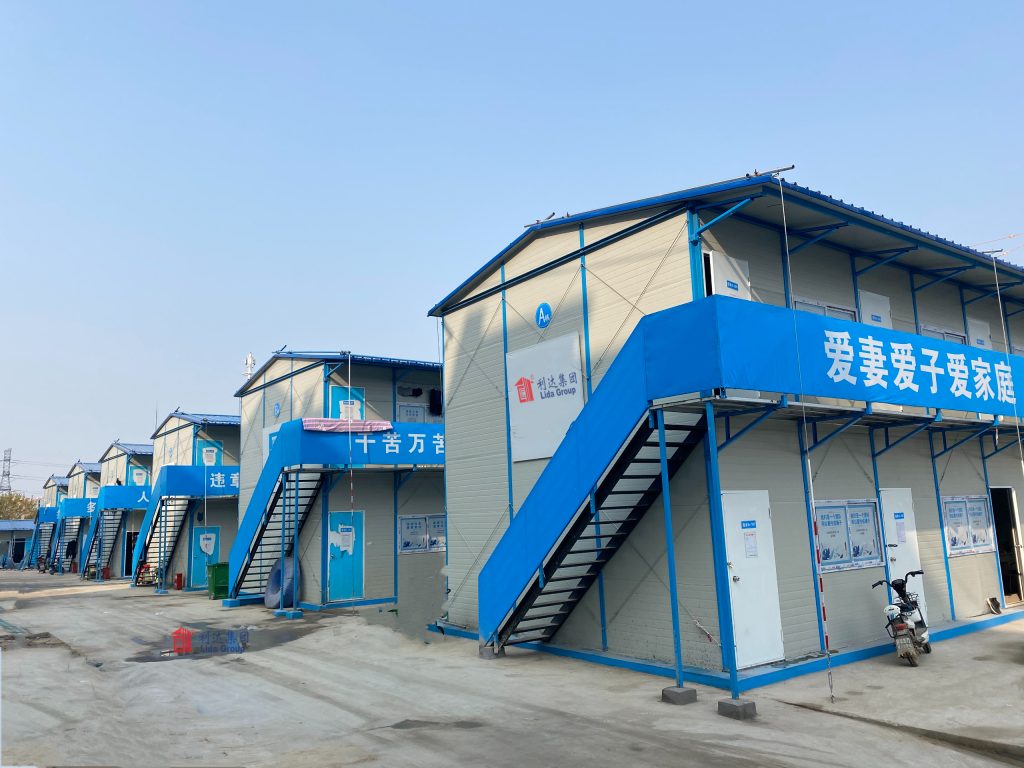
Autonomous Assembly and Transportation
To further streamline deployment, Lida is exploring autonomous technology for module assembly and transportation. The company is partnering with robotics firms to develop self-guided cranes that can assemble modules with minimal human intervention, reducing assembly time by an additional 20%. For transportation, Lida is testing AI-powered route optimization software that considers factors like load capacity, road restrictions, and weather conditions to minimize delivery times and fuel consumption. These technologies will make Lida’s dormitories even more convenient for customers operating in remote or labor-scarce regions.
Enhanced Smart Living Features
Building on its existing smart BMS, Lida plans to integrate more worker-centric smart features. Future dormitories will include biometric access control (for security), air quality monitors (that adjust ventilation in response to pollutants), and personalized climate control (allowing workers to set preferred temperatures via a mobile app). The company is also exploring IoT-connected laundry systems that notify workers when their laundry is done, and shared kitchen appliances that can be reserved via the app—improving convenience and reducing conflicts over shared spaces.
Circular Economy Initiatives
Lida is doubling down on sustainability by launching a circular economy program for its dormitories. The program will include a take-back and recycling scheme: when modules reach the end of their lifecycle, Lida will repurchase them, disassemble the components, and recycle or repurpose 95% of the materials (including steel, aluminum, and foam). The company is also developing a “modular upgrade” service, allowing customers to replace outdated components (e.g., HVAC systems or lighting) without replacing entire modules—extending usability and reducing waste. These initiatives align with the global construction industry’s goal of achieving net-zero carbon emissions by 2050.
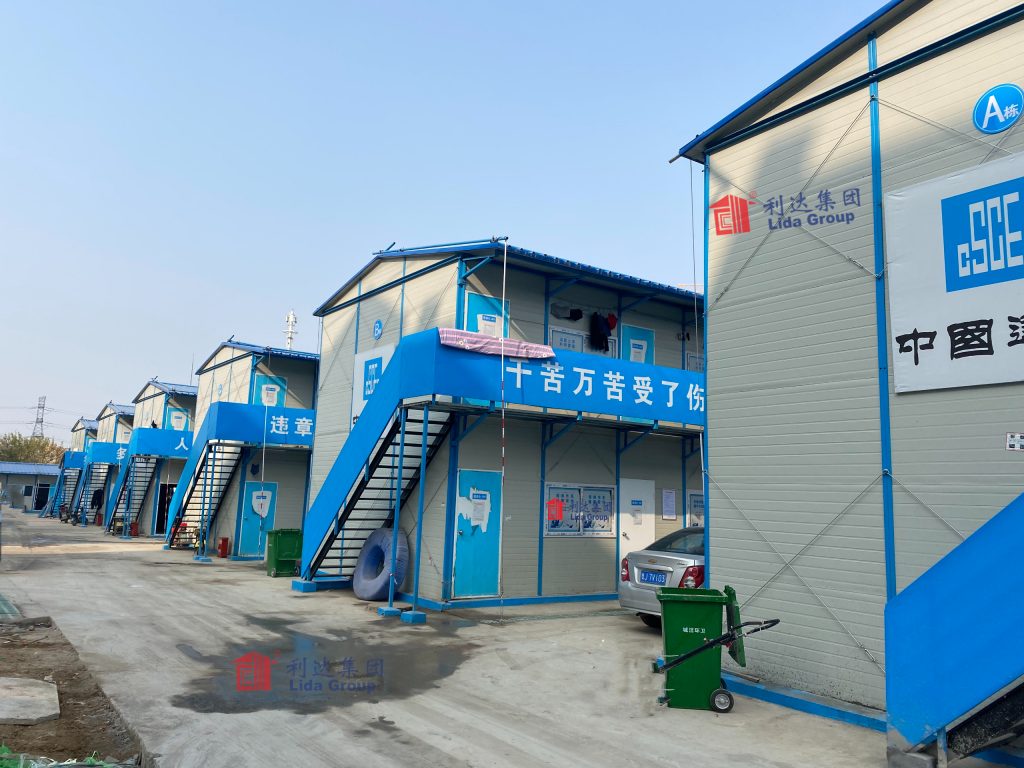
Conclusion
Lida Group has redefined the standard for prefab worker’s dormitories by masterfully combining the durability of sandwich panels with the convenience of mobile modular design. In an industry plagued by inefficient, low-quality accommodation solutions, Lida’s offerings address the core needs of construction firms: speed, compliance, sustainability, and worker welfare.
The company’s sandwich panels—with their exceptional structural strength, insulation, fire resistance, and weather durability—provide a robust foundation that outperforms traditional building materials and competitors’ prefab components. Meanwhile, the mobile modular design enables rapid deployment (in days, not weeks), easy relocation, and flexible customization, making the dormitories adaptable to projects of all sizes and locations. Technological innovations like smart BMS and digital twins further enhance efficiency and durability, while real-world case studies from Europe, the Middle East, and Southeast Asia validate the solution’s practical value.
Lida’s competitive advantage—rooted in its durability-to-weight ratio, customization capabilities, cost efficiency, and global compliance expertise—has made it a trusted partner for construction firms worldwide. Looking ahead, the company’s investment in advanced materials, autonomous technology, and circular economy initiatives promises to push the boundaries of what prefab worker accommodation can achieve, extending lifespans, reducing environmental impact, and improving the living experience for workers.
In a construction industry increasingly focused on speed, sustainability, and people, Lida Group’s prefab worker’s dormitories are more than just a housing solution—they are a catalyst for better, more efficient project delivery. By proving that durability and convenience do not have to be mutually exclusive, Lida has set a new benchmark for the industry and paved the way for a future where worker accommodation is safe, comfortable, and aligned with the needs of a rapidly changing world.
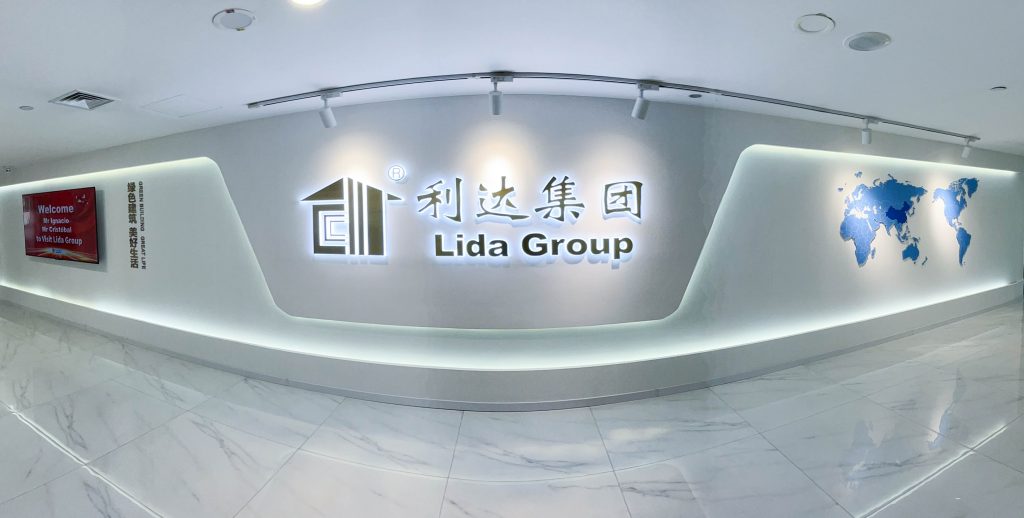
Related news
-
The Future of On-Site Accommodation: Smart Technology Integration in Lida Group's Prefab Building Container House Units.
2025-08-27 17:32:34
-
Lida Group Sets a New Benchmark for Rapid Deployment with Its High-Quality Mobile Building Worker Dormitories
2025-09-02 17:37:17
-
Lida Group Integrates Modern Amenities into Its High-Quality Container Worker Houses Using Smart Prefab Building Techniques
2025-08-27 17:21:28
contact us
- Tel: +86-532-88966982
- Whatsapp: +86-13793209022
- E-mail: sales@lidajituan.com


